“We Need to Talk About Kevin” (2011), unpacking what’s “natural” about motherhood
2 May 2012
We’ve all seen it before: the 2-yr-old is standing in the middle of the room screaming his head off. His face is red, his hands balled into comical little fists. His mother and I stare at him with a kind of exhausted paralysis. She looks at me and says flatly (and funnily), “Oh, the maternal ambivalence.” This takes place years before either of us was aware of We Need to Talk About Kevin, either book or film. Now I wish I’d seen the film with her — I can’t imagine how interesting our post-viewing debriefing could have been, how much more I could have learned from that conversation.
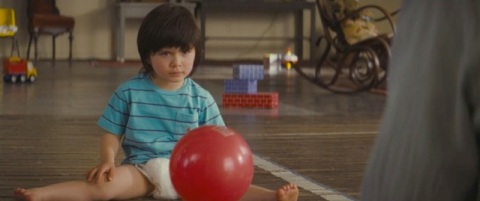 “Maternal ambivalence” isn’t just the right statement in a situation like when your kid has one of those histrionic meltdowns; it’s the only one to mitigate the maternal sense of failure and the simultaneous balking at calling it “failure.” If your kid behaves horribly, impossibly, inconsolably, how do you as his mother evade the sense that you ought to apologize for his awfulness, as if it’s your fault? How do you know it’s not your fault — in fact, isn’t it sort of your fault? How do you stop feeling implicated in the mini-psychodramas of a 2-yr-old – who, frankly, is probably going to act out no matter what you do? How do you help but feel that when they’re in this state, a 2-yr-old is often a kind of little animal with no reason and certainly no manners, and therefore out of your control?
“Maternal ambivalence” isn’t just the right statement in a situation like when your kid has one of those histrionic meltdowns; it’s the only one to mitigate the maternal sense of failure and the simultaneous balking at calling it “failure.” If your kid behaves horribly, impossibly, inconsolably, how do you as his mother evade the sense that you ought to apologize for his awfulness, as if it’s your fault? How do you know it’s not your fault — in fact, isn’t it sort of your fault? How do you stop feeling implicated in the mini-psychodramas of a 2-yr-old – who, frankly, is probably going to act out no matter what you do? How do you help but feel that when they’re in this state, a 2-yr-old is often a kind of little animal with no reason and certainly no manners, and therefore out of your control?
I’m hardly the first to notice that ours is a particularly hysterical culture when it comes to blaming mothers, mothers blaming themselves. I’d go so far as to say that ambivalence is a healthy response to the schizophrenic messages about what motherhood is supposed to be. With that in mind, however, let me say: We Need to Talk About Kevin is not for the faint of heart.
What you realize while watching Lynne Ramsay’s film is that we never seen representations of mothers who feel riddled by ambivalence. Dads? Sure. As bracing as Louis C. K.’s humor about being a bad parent can be, it’s popular, socially acceptable, hilarious. Mothers don’t get the same leeway. Moms are supposed to be happy, well-adjusted, delighted with their children. Pregnancy is supposed to make women glow. Motherhood, we hear all the time, is supposed to draw out women’s “natural” self-sacrificing tendencies. Good mothers, we learn, raise good children.
But then there are those dark exceptions. What about that mother who drowned all her children? Whose fault is it if your kid is a bully or a mean girl? Worst of all: when a kid kills fellow students in a school shooting rampage, who do you blame? These are some of the dark questions We Need to Talk About Kevin explores.
Eva (Tilda Swinton) wasn’t always so ambivalent. As a travel writer, she can remember some pretty transformative, ecstatic experiences; she’s not given to depression. There was that one time when she crowd surfed during that tomato festival, when she and everyone else was drenched in smashed tomatoes. You have to look carefully at first to see whether she’s hysterical or elated.
She experienced sex that night with the same giddy elation. Franklin (John C. Reilly) asked if she was sure she wanted to go without the condom — and she said yes, she was sure. For a moment there, she wants to be pregnant and knows perfectly well that their drunken, happy sex might get her there.
The actual experience of pregnancy is something else again. All those other blissful and very pregnant women stretch and happily rub their enormous bellies in the locker room of the Y after that prenatal yoga class, while Eva looks glum. She walks out of the gym amidst a stream of giddy six-yr-old ballet students and is unmoved by their pink tutued effervescence.
It doesn’t change after the birth. She doesn’t want to be this way — she just is. Even worse, he’s a colicky baby, screaming constantly. It’s even worse when she realizes that the baby quiets down the minute Franklin gets home, confirming his belief that Eva has over-reacted to the baby’s fussiness. All of this makes her feel guiltier. She’s a bad mother for not liking that baby more … but his screaming makes it all the harder. Even a jackhammer is preferable to that scream.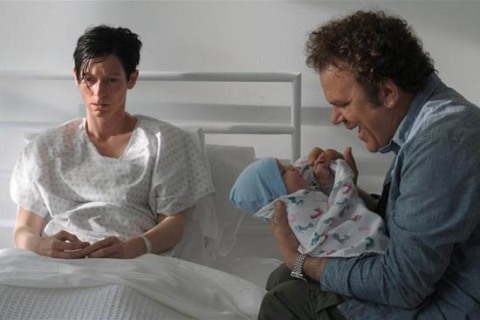
Look at Franklin with his son. He’s delighted. He functions as the quintessential, bright-sided American optimist. Everything’s great! And the baby responds in kind: Franklin’s presence is a balm to little Kevin. Every time his father appears, Kevin transforms into a different child.
What’s wrong with her? Is she responsible for his awful aggression? Yet she can’t help but think there’s something wrong with this child — really wrong. And when she says “something wrong,” she invokes that little kernel of anxiety that keeps you wide awake, heart pounding, at 3am with worry about what that something might be. She takes the toddler to the doctor, who gives him an unequivocal thumbs up. Whew — right?
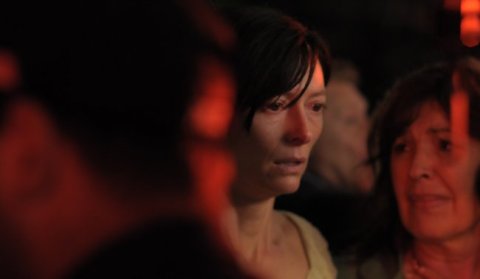
The film ultimately makes a surprising move. Seen through Eva’s eyes, we have no doubt that Kevin is a sociopath — a brilliant, manipulative, unfeeling monster. But the film doesn’t let Eva off the hook (just as she never lets herself off). Nor is this a self-flagellating move. The film does something amazing, disturbing, revelatory: it shows that although she may not be responsible for Kevin’s psychosis, the crazy intimate antagonistic fucked-upness of their mother-son relationship is, in fact, at the very center of Kevin’s choices about acting out. Insofar as he wants, above all else, to keep her engaged with him — to provoke her out of her maternal ambivalence and malaise — she is, in fact, partly responsible, and she will never get over it.

In addition to offering us this creepy, awful realization, however, Lynne Ramsay’s film is a sustained critique of the crazy cultural contradictions we hurl at mothers all the time. Those reality shows filled with problematic children and terrible parenting — parents who cede authority to a stranger who shames them on network TV. State laws that not only permit potential employers to ask women whether they’re mothers, but which view motherhood as a “problem” for a woman doing the job (mothers are disproportionately discriminated against in hiring and promotions, and pay a “mommy penalty” in lower wages for the rest of their careers). Draconian new laws designed to criminalize “bad” mothers even when the science of such determinations is sketchy at best — these are just tips of the iceberg of schizophrenic ways that American mothers are simultaneously put on pedestals and punished. Google “mommy wars” and you’ll find infinitely more chaos.
Early on in the film Eva walks out of a job interview, feeling uncharacteristically good. As she approaches a couple of very well-heeled middle-aged women she knows, she begins to smile to greet them. One of them reaches up and smacks Eva, hard, across the face.
A man rushes up behind the stunned Eva to help, to call the cops, to do something. “No, no, no … it was my fault,” she assures him. At first this seems like the craziest, most masochistic statement you can imagine.
The thing is: she really believes it. And our culture put her there. This utterly memorable, haunting, scathing film will not let you believe those questions about nature vs. nurture, innocence vs. guilt, or good mothers vs. demon mothers are simple ones. You’ll leave this film feeling like you’ve been smacked, too.
And yet there’s something about the ending that feels … do I dare say it feels like a change in the air? Not revelation, not transformation, but something new. Please watch We Need to Talk About Kevin and tell me what you think. I for one can’t stop thinking about it.
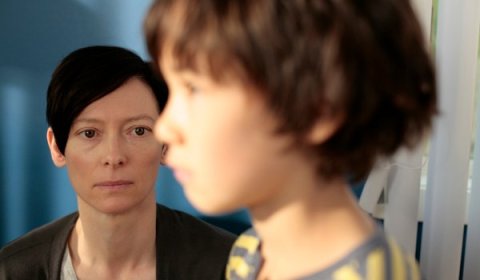


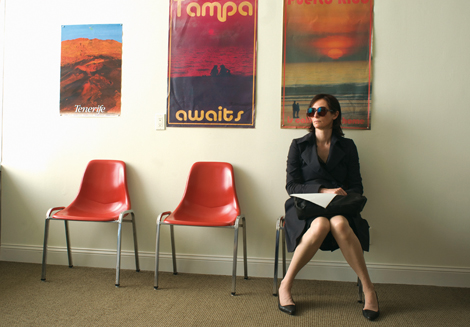





2 May 2012 at 11:10 am
That should help bring down the birthrate!!!
Seriously, for most of us, it isn’t that bad. I’ll never forget the 48 hour tantrum my granddaughter threw once. Tilda Swinton would have killed herself! But now that my granddaughter can throw herself into ballet and tap, she’s just fine and very grown up for her age.
I will watch the movie, though, just for the fun of seeing Tilda Swinton, who is such a peculiar yet fascinating actor. Does her face ever move?
2 May 2012 at 1:52 pm
Yeah, it’s worth noting that Eva’s experience of motherhood isn’t any kind of norm. All the more reason for me to find this film so bracing and original and audacious. I’d be surprised if more people didn’t find parts of her experience recognizable, even if they had unproblematic kids and happy pregnancies.
How do I love Swinton? Her face is eminently watchable. There’s something I haven’t quite articulated yet about her acting, that immovable look and slack jaw of hers…there’s something about the aesthetics of self-disgust, or something. On the other hand, I watched 45 minutes of her film Julia — about a manic alcoholic, in which Swinton is all twitchy energy and too much makeup — and although Swinton’s performance is crazy great, I found the film so painful and extreme I had to quit. We’ll see if I can ever get back to it.
2 May 2012 at 11:32 am
I thought about this film for a long time. I even included it in my What’s Next/Coming Attractions. But when I wanted to see it, it wasn’t playing in town.
Time passed, and eventually it did show up but got a short run. It was way too serious of a topic, not at all the kind of film to excite people and have lengthy lines of avid ticket buyers. I live in Sarasota, where it is always sunny and nice – seeing the film would mean having to live under a personal dark cloud for awhile. That was one way of thinking about it.
From the theater chain’s perspective – it would be eminently more profitable to show the latest animated feature in both 2d and 3D than have a theater that would be more empty than filled during this film’s run. So they let it go.
But as I began reading this I thought that there will be a DVD soon, or there might already be a DVD. The deeper into your post I got, the more I wanted to see the film.
Then I hit a wall. Or maybe a better term is I got blind-sided. That was when Tilden’s Eva got smacked by the well-to-do woman that she knew. I can’t imagine how terrifying or shocking that was for her – to struggle to her feet and then say … it was my fault. And then have to pick herself up and drive home where a life of dread was waiting.
So I’m back to that ambivalent feeling of deciding about taking in this film. It seems a daunting challenge.
Thanks for this superb post. If I do see WNTTAK it will be because of this post.
2 May 2012 at 1:47 pm
Oh JMM, you’ve got to see it. Ramsay is just an audacious director — I could have waxed eloquent about her use of color, her in-your-face visuals. Like you, I waited MONTHS for this, and it was different than I expected. The end of the film is such a fascinating payoff…oh, how I want you to see it and converse with me about that ending.
2 May 2012 at 12:11 pm
I was equally blown away by this film, as I was by the book that preceded it. I cannot wait to use it in a class, because I think that it’s not only visually stunning, but will be a fantastic, and contentious, discussion starter. I think your thoughtful exploration of this film really gets to the heart of the Mommy Myth debates that continue to haunt us.
While one hopes that adaptations bring out the best of a work in a medium specific way, I went to see the film with a friend who had never read the book, and she pointed out that Eva seems wholly victimized within the film. Structurally, with the book’s epistolary form, one gets the sense of Eva’s strength and struggle. I suggested that some of Ramsey’s moody, experimental flourishes tried to get at Eva’s inner life, but it’s sometimes so hard to accomplish in a work bounded by a 2-hour time limit. I love Tilda Swinton in so many things, but I wonder if she was just a touch too somnambulistic. What did you think?
BTW, I am so impressed by the beauty and sophistication of your blog. Your series on Cult Film Horror Films about Female Monsters is really awesome, and made me want to watch so many of the films that you mention. How do you make the time?
2 May 2012 at 1:45 pm
Oh Dark Iris. Now I wish I’d debriefed with you. My sister and I spent 3 days talking about it intermittently.
Sometimes the blog takes over — when a really good discussion starts up. But most of the time I chip away at something … like this Kevin post, for example, which took about a month. Overall I feel strongly when I say this has made me a better academic writer, and more prolific.
Then, of course, there are the times when I’d much rather write about Female Monsters than my stupid article on some stupid esoteric subject only 10 people will read in the history of the universe. It’s far more appealing to post something about Female Monsters in the morning and come home to discover it’s been clicked on 84 times.
Most important on the issue of time management I must admit I’m on a research leave right now and just have more time not dedicated to grading student work. And even still, I frequently go silent for a week at a time.
3 May 2012 at 12:35 pm
I will watch this film, in the light of what you and your commenters say about it, but only after I get over the first rush of having a new granddaughter.
7 May 2012 at 8:13 am
Congratulations, Hattie! What lovely news. I suspect that Kevin is not for people who have recently experienced the unmitigated joy of a new child in the world. Save it for another, less joyous and more introspective moment.
9 May 2012 at 2:04 pm
Right. I will see the movie eventually.
19 May 2012 at 3:29 pm
[…] to say, The Bad Seed could be paired with We Need to Talk About Kevin for one of the most disturbing double features ever. (Who would come to such a double […]